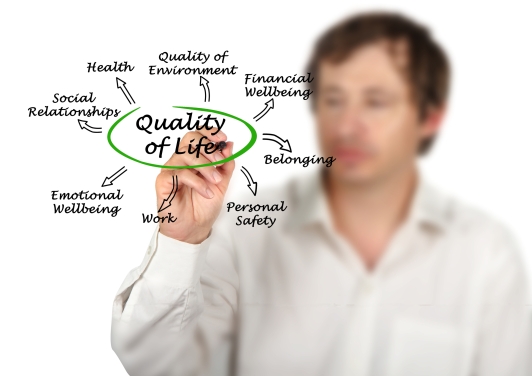Sausage or steak? Chicken or lamb? Veggie burger anyone? Typical questions asked around barbecues on any given night when friends or family are around. Barbecues are the watercoolers around which conversations about life take place. What’s hitting our hip pocket. The difficulty of securing suitable childcare. The complexities of navigating the aged care sector for our parents. And so on. Life may be pretty dandy for one barbecue guest while another may claim that we are no better off now than 10 years ago. And so on.
When we assess our quality of life I’m sure the answers we’re looking for are less about ‘numbers’, and more about the quality of our lives. Admittedly these things can be really hard to gauge. We’re accustomed to being fed measurements of our country’s progress through economic indicators such as Gross Domestic Product (GDP) – annualised, quarterly. 2% – “Is that good”? we may ask. “It used to be higher, but it is now trending up, albeit slowly, so that must be good. Shouldn’t it”? Maybe…
To be sure, if our economy were a car, the GDP odometer would be one of the main indictors to watch, going some way to tell us how well our journey is going. That we’re nearly ‘there’. That we’re making good progress. Economists and governments will continue to track our economic wellbeing using the stable of measures – GDP, inflation, employment levels and interest rates – that’s managing the economy well. But such rudimentary indicators leave us unsure of their relevance to our daily lives.

I’m pretty sure we all want to leave Australia a better place for our kids and for their kids, in our own families, and also more broadly as a community. But what does that look like? What do we actually want to change or improve? How can we be sure we’re making progress? Black and white economic indicators alone can’t and don’t capture the full colour of our lives. If GDP is weak, we’re bound to feel the effects early on in our job security, in our ability to pay mortgages and rent, and stagnation of incomes. But a single economic indicator says nothing about our quality of life – social inclusion, responsible global citizenship or trust in each other or in our public institutions.
But back to the barbecue and the conversations around how life is, and more broadly, how Australia is going and whether we’re making a good go of our lot Down Under. I’ve noted for a long time the disconnect between our presumed progress, extracted from sets of economic indicators, and our day to day lived experience. The cost of living, the quality and access to health and education services, and how, if at all, we are experiencing life in the workplace, in our families, in the community, and the progress barometer of more existential conversation topics such as justice, equity, fulfilment in life, and an understanding of how Australian society is improving or declining.
ANDI, the Australian National Development Index, is a holistic measure of national progress and wellbeing, and although still in its formative years, could very well find itself shaping barbecue conversations in future years. The index reflects the values and priorities of Australians and will seek to tell us how we are doing as a nation.
The index is being developed by a coalition of leading community organisations, peak bodies, businesses, faith-based organisations, researchers, and independent, non-partisan grassroots citizens. The initiative is coordinated by the University of Melbourne. Importantly, input is being sought from Australians mainly through workshops where tables of five participants, using an electronic meeting system that captures input from each group using a wireless keyboard, respond to questions in groups, with contributions shown on a screen and then captured, sorted and delved further into later.
I participated in one of these workshops in Melbourne recently, impressed with the nature of the contributions, and equally feeling empowered and exhilarated through the participation in such a democratic process. ANDI is in pilot phase, with many years of refining to come, including ensuring fair and equal contributions from across the breadth of Australia’s diverse communities. For those of us that yearn for public policy debates to be civil – to be a real contest of ideas, rather than the polarising clash of ideologies, helping shape policy settings relating to health, educational, indigenous and environmental matters, to name a few, just got more participatory and engaging.
In a promotional video, ANDI board member Rev. Tim Costello AO says, “The real work of what a just society is… we intuitively know but we don’t measure it.” Fellow board member Professor Fiona Stanley says of ANDI, “It’s an attempt to get beyond the financial measures to say what do we value as a society, what are our real values? What do people on the street think about our values? Can we measure them?”.
If developed well, ANDI’s goal to measure what matters to Australians, will hopefully play a key role in helping us better understand the kind of Australia we want to live in, and importantly how we track progress on reaching the qualities of the life we aspire to.

This fledgling tool brings a human element to the human condition. While it’s impossible for any one measurement of wellbeing to uniquely reflect the lived experience of any given household, ANDI strikes me as an important step to move away from relying only on government and indeed commentators’ quality of life assessments through a limited economic lens, to accommodate the elements of life such as wellbeing and life satisfaction, environment, sustainability, justice, fairness and human rights, that I’m sure are closer measures of what matters to each of us.
ANDI is worth checking out and I encourage you to follow its progress and to participate where possible. In doing so you will play an important role in helping shape our country’s future, and importantly, know where we’re going and ‘are we there yet?’ You’ll also have new barbecue conversation starters as you tuck into that steak or vegie burger.
Feel free to share with me what’s important to you when thinking about the Australia you want to live in.
I am contesting the next federal election in the electorate of Chisholm in Melbourne’s eastern suburbs. If you’d like to meet up or have me speak in your networks, workplace or community group, please contact me on campaign@antclark.vote or call 0422 939 200. Website coming soon.
If you’d like to receive campaign updates including blog posts, visit http://eepurl.com/c0lvXf
Authorised by Ant Clark, Independent Candidate for Chisholm, Unit 1/167 Surrey Road, Blackburn VIC 3130